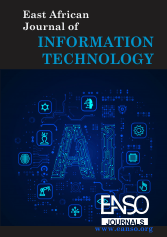Role of Learning Flexibility Provided by E-Learning Platforms on Employee Upskilling
Abstract
This research investigated the role of e-learning platforms in enhancing employee skills in the modern era in Tanzania, concentrating on the Ministry of Land, Housing, and Human Settlement Development in Mbeya. This study addresses a gap in Tanzanian research that has primarily focused on ICT adoption in the private sector. It applied Human Capital Theory and organisation support Theory to examine three dimensions: learning flexibility, content clarity and accuracy, and user support. A descriptive research design integrating quantitative and qualitative methodologies was used with data gathered from 72 employees out of a total population of 105 and analysed using descriptive statistics via SPSS version 20. The results showed that e-learning platforms greatly improve employee upskilling by allowing them to train while they work, providing accurate content that helps them understand, and giving them assistance that keeps them interested. The study suggests that ICT infrastructure should be improved, content should be updated regularly, support systems should be improved, digital literacy should be promoted, and e-learning should be included in performance management frameworks
Downloads
References
Almeida, J., Silva, R., & Pereira, T. The role of helpdesk responsiveness in e-learning effectiveness for remote employees in Portugal. European Journal of Online Learning, 8(4), 2020, 155–169.
Chen, L., Zhang, H., & Wang, Y. Exploring the role of ICT in employee skill enhancement in Chinese manufacturing firms. Journal of Workplace Learning, 32(4), 2020, 210–225.
Cheng, B. Promoting employee career growth: The benefits of sustainable HRM practices. Journal of Business Research, 124, 2021, 522–530.
Etikan, I., Musa, S. A., & Alkassim, R. S. Comparison of convenience sampling and purposive sampling. American Journal of Theoretical and Applied Statistics, 5(1), 2016, 1–4.
Harris, L., & Brown, G. Mixing interview and questionnaire methods: Practical problems in aligning data. Practical Assessment, Research, and Evaluation, 20(1), 2015, 1–9.
Heale, R., & Twycross, A. Validity and reliability in quantitative studies. Evidence-Based Nursing, 20(3), 2017, 66–67.
Keegan, A. Dynamism and realignment in the HR architecture. Human Resource Management, 62(2), 2023, 233–249.
Kothari, C. R. Research methodology: Methods and techniques (4th ed.). New Age International Publishers, 2019.
Lwoga, E. T., & Komba, W. L. E-learning adoption in Tanzanian universities: Opportunities and challenges. International Journal of Education and Development using Information and Communication Technology, 11(3), 2015, 4–20.
Mutisya, D., & Makokha, M. E-learning adoption in Kenyan universities: Challenges and opportunities. International Journal of Education and Development using Information and Communication Technology, 12(1), 2016, 32–48.
Noe, R. Employee training and development. New York, NY: McGraw-Hill Education, 2017.
Salas, E., Tannenbaum, S. I., Kraiger, K., & Smith-Jentsch, K. A. The science of training and development in organizations: What matters in practice. Psychological Science in the Public Interest, 13(2), 2012, 74–101.
Smalley, L. Continuous learning at work: The power of gamification. Journal of Workplace Learning, 34(3), 2022, 150–165.
Sykes, S., & Jones, C. The role of digital literacy in employee upskilling within South Korean corporations. Journal of Workplace Learning, 31(2), 2019, 123–139.
Saunders, M., Lewis, P., & Thornhill, A. Research methods for business students (8th ed.). Pearson Education Limited, 2019.
World Economic Forum. The Future of Jobs Report 2020. 2020.
Zhou, Y., & Zhang, L. The impact of e-learning on employee productivity and satisfaction. Journal of Workplace Learning, 32(5), 2020, 210–229.
Copyright (c) 2025 Gifricy Alphonce Fucy

This work is licensed under a Creative Commons Attribution 4.0 International License.




























